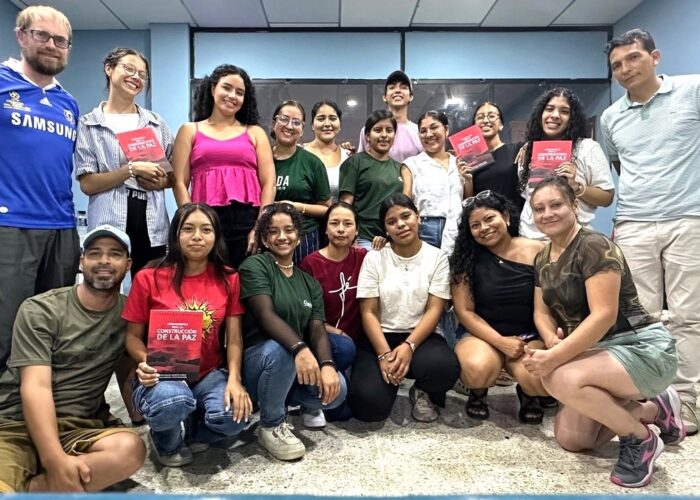PORTLAND, Ore. (Mennonite Mission Network) — Finishing up education. Establishing a career. Working on relationships. Changing diapers. These are all normal activities of the late-20s, early-30s crowd. At Portland (Ore.) Mennonite Church, add spearheading a mission initiative to the list.
High in Ecuador’s Andes Mountains, David and Ericka Gingerich are settling into life in a new culture. Back home, their Ministry Support Team, whose oldest member is 34, eagerly awaits news from them, which they’ll in turn pass along to the rest of the congregation.
The Ministry Support Team model is one way Mennonite Mission Network helps congregations support international workers. Portland Mennonite’s pastor, Rod Stafford, said this model has created a great deal of excitement among the younger adult crowd.
“To personally know someone in Ecuador and what they’re doing generates energy, passion and thoughtfulness about their own lives,” he said.
|
Development deals with more than money David and Ericka Gingerich had planned to finish paying off student loans before looking for an international service assignment. But in June 2004 they agreed to meet with Marlene Kroeker, development associate at Mennonite Mission Network, just to talk about their hopes and dreams for the future. That future came sooner than they had anticipated when Kroeker invited them to consider taking over when another couple’s term was completed. Kroeker said her role is to help people think about ways they can become involved in the work God is doing through the Mission Network. She encourages members to support mission through the gifts they have: prayer, financial giving, serving or joining Ministry Support Teams like the one formed for the Gingeriches. The Mission Network’s development associates are available to help your congregation become more involved in missions. To contact the associate in your area, look online or call toll-free: 1-866-866-2872. |
It’s also a way for younger generations to take ownership of an important congregational function. Stafford said the group efficiently raised financial support. They prepared and carried out a commissioning service. Now, they run a Web site with updated photos and manage a periodical newsletter to help the congregation know how to pray for members serving a continent away.
Angie Gardner is the communication coordinator for the team, and though she has attended Portland Mennonite for three years, she never spoke up during worship services until a few months ago. She was nervous about standing up to announce the Gingeriches’ safe arrival in Ecuador. “It was nowhere near as scary as I thought it would be,” she said. Visibility through subsequent announcements has helped her meet more people. “I actually feel more connected to the congregation,” Gardner said.
“It seems like when a Ministry Support Team is made up of younger people, they don’t get nervous [about details] because they don’t know any other way,” said Marlene Kroeker, development associate at the Mission Network. Kroeker invited the Gingeriches to consider serving and helped set up their Ministry Support Team. “They ask, ‘What can we do?’ and come up with 100 ideas.”
For the Gingeriches, asking their small group, better known as The Flock, to function in this role only made sense.
“It simply felt natural to ask those who already had invested time in building concrete, trusting relationships with us to take on the Ministry Support Team role,” David Gingerich said. The group was an “integral part of our discernment process” that affirmed their individual gifts and supported them in prayer.
Sarah Gammell Matthews, who serves as the Ministry Support Team leader, said it’s a privilege to accompany close friends in the work they’ve always dreamed about doing.
As the Gingeriches processed their decision about serving in Ecuador, they participated in a Sunday-school class which was exploring the language Christians use to talk about sharing their faith. Matthews said in the beginning the word “evangelism” carried negative connotations.
“We are uncomfortable sharing [our faith] with words because we think of people handing out tracts on street corners, being obnoxious and saying, ‘You have to be saved right now or you’ll go to hell,’” she said.
“It can be scary and difficult,” Matthews said. “But we have to have words to go along with the actions.”
The Gingeriches now have the opportunity to serve in word and deed in the indigenous Kichwa community of Cebadas, Ecuador. They serve in the Ñukanchik Yachay (Our Wisdom) alternative school. Ericka Gingerich joins an indigenous staff as an elementary school teacher. The school has asked her to help them meet their goal of trilingual education for the children: Kichwa, Spanish and English. They also work closely with a local congregation, Iglesia Indígena Evangélica Belén. David Gingerich’s role includes teaching and helping with other school, church and community projects.
“David and Ericka’s willingness to serve and genuine love for others will be apparent in Cebadas,” Gardner said. “Those are the building blocks of what mission and evangelism are really about.”



